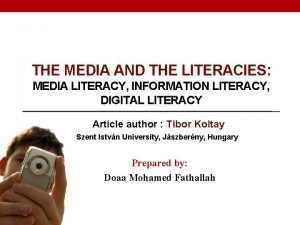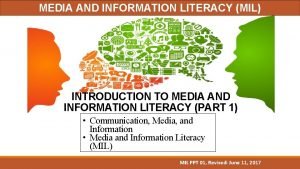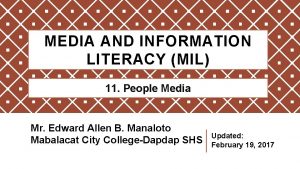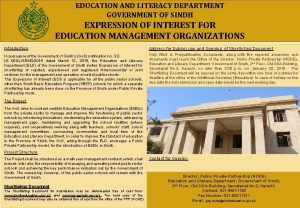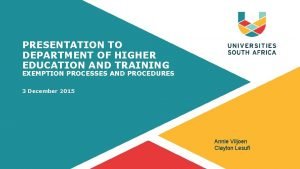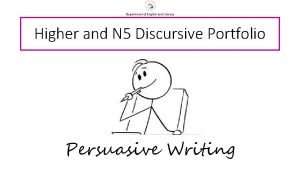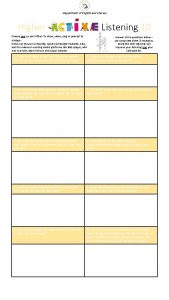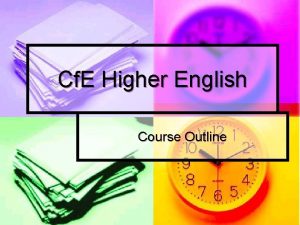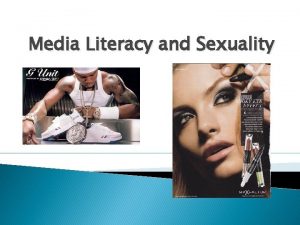Department of English and Literacy Welcome to Higher







- Slides: 7

Department of English and Literacy Welcome to Higher English

Moving from National 5 to Higher National 5 and Higher English courses have the same structure: the same shape, and outline. However, an exam called Higher is bound to be more challenging, and will demand more from you.

Performance in Spoken Language This is assessed in class. There is no mark or grade for this: all you have to do is show the necessary skills that prove you have met the criteria to pass the task. What’s Expected at N 5 What’s Expected at Higher The Increased Challenge You are assessed on at least one spoken language activity. This can be either in a presentation to an audience (which must include responding to audience questions) or in a group discussion. The language you should use goes from ‘detailed’ at N 5 to ‘detailed and complex’ at Higher. This means using: • longer and more sophisticated sentences • more varied sentence types • wider and richer vocabulary

The Portfolio The folio is worked on independently, although teachers do give advice and support. Both first drafts are usually handed in before prelim time and then the final drafts are submitted by the March of your exam year. Each piece is marked out of 15, meaning your whole Portfolio is worth up to 30 marks. What’s Expected at N 5 What’s Expected at Higher Your Portfolio contains two pieces of writing: One is ‘broadly creative’, usually either a piece of fictional writing, or a personal reflective essay. The other is ‘broadly discursive’, such as a persuasive essay or a report. Your Portfolio contains two pieces of writing: One is ‘broadly creative’, usually either a piece of fictional writing, or a personal reflective essay. The other is ‘broadly discursive’, such as a persuasive or argumentative essay. Each piece can be no more than 1000 words long. Each piece can be no more than 1300 words long. The Increased Challenge You should write longer pieces. You should use more sophisticated ideas and overall structures. The language you are expected to use goes from ‘detailed’ at N 5 to ‘detailed and complex’ at Higher. This means using: • longer and more sophisticated sentences • more varied sentence types • wider and richer vocabulary

Reading for Understanding, Analysis and Evaluation This is the first of the two exam papers. You will read some non-fiction that you have never seen before, and then answer questions on this. The task is worth up to 30 marks. What’s Expected at N 5 What’s Expected at Higher The Increased Challenge You read one passage, written in ‘detailed’ language. The passage will be about 800 words long. You have 1 hour to complete the task. At National 5, using a suitable quotation in an answer always earns you 1 mark straight away. You read two passages, written in ‘detailed and complex’ language. The first passage will be about 800 -900 words long, the second about 600700 words. They will be on linked topics, but by different writers. You have 90 minutes to complete the task. At Higher, though you are still expected to quote in your answers to support your analysis and explanations, quoting does not earn you any marks. The language and ideas in the Higher passages will be more sophisticated. There is more material to read overall. The first 25 marks can be earned from answering questions on passage 1. To earn last 5 marks, you must grasp the second writer’s ideas and argument, and then be able to compare the ideas of both writers. There are no marks for quoting: every mark you get must be earned by your analysis and explanation.

Critical Reading: The Scottish Set Text This is part of the second exam paper. You will see an extract from a Scottish text that you have studied, and will answer questions on it and on wider aspects of the writer’s work. This task is worth up to 20 marks, and must be done in about 45 minutes. What’s Expected at N 5 What’s Expected at Higher The Increased Challenge The first 12 marks can be earned by answering on the text printed in the exam. The final 8 marks come from your ability to answer on wider aspects of the writer’s work. At National 5, a suitable quotation always earns you 1 mark straight away. The first 10 marks can be earned by answering on the text printed in the exam. The other 10 marks come from your ability to answer on wider aspects of the writer’s work. At Higher, though you are still expected to quote in your answers to support your analysis and explanations, quoting does not earn you any marks. As there are more marks for answering on the writer’s wider work, you need in-depth knowledge of this There are no marks for quoting: every mark you get must be earned by your analysis and explanation.

Critical Reading: The Critical Essay This is the other part of the second exam paper. You will choose a suitable essay question that will let you write about a text you have studied. This cannot be the same text, or from the same genre, as the one you answered on in the set text task. This task is worth up to 20 marks, and must be done in about 45 minutes. What’s Expected at N 5 What’s Expected at Higher The Increased Challenge In each of the possible genres that you can write about, you will have 2 essay questions to choose from. In each of the possible genres that you can write about, you will have 3 essay questions to choose from. Although the essay questions at both levels are quite open, so that every candidate can find a question that suits them, the questions at Higher are harder. Critical essay questions at Higher ask you to write about more subtle and complex ideas and techniques.
